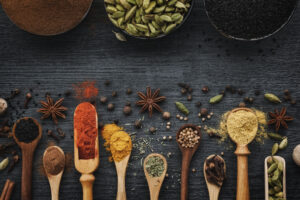 Have you been wanting to give up your morning coffee, but just can’t seem to find a decent replacement for that essential jumpstart? You may be comforted to hear that you are not alone. In fact, it is claimed that about 83% of adults in America are coffee drinkers. It’s no surprise with its tempting aroma, its unique taste, and of course its ability to create physical energy and mental alertness almost instantly. Unfortunately, many studies have shown the long list of negative effects that regular use of this substance will bring. According to Ayurveda, coffee and caffeine alike are tri-doshically provoking, meaning that no matter your body type, caffeine will cause imbalance over time (in some folks quicker than others).
Have you been wanting to give up your morning coffee, but just can’t seem to find a decent replacement for that essential jumpstart? You may be comforted to hear that you are not alone. In fact, it is claimed that about 83% of adults in America are coffee drinkers. It’s no surprise with its tempting aroma, its unique taste, and of course its ability to create physical energy and mental alertness almost instantly. Unfortunately, many studies have shown the long list of negative effects that regular use of this substance will bring. According to Ayurveda, coffee and caffeine alike are tri-doshically provoking, meaning that no matter your body type, caffeine will cause imbalance over time (in some folks quicker than others).
Although socially accepted, caffeine is indeed an addictive drug that has been shown to alter your brain’s chemistry with long-term use. It increases the level of dopamine (the feel-good neurotransmitter), inhibits the absorption of adenosine (the sleep-inducing neurotransmitter), and triggers the secretion of adrenaline (the fight-or-flight stress hormone). For all of these reasons, many individuals are drawn to their morning coffee, eventually relying on it for their daily focus and energy.
Taking in caffeine routinely over time creates a physical and mental dependency, leaving you extremely tired, foggy-headed, and in a foul mood if you do not give in to this daily habit. Individuals who have a stronger addiction may also face more severe symptoms such as headaches, body aches, nausea, and other flu-like symptoms if they go too long without some sort of caffeine.
Many individuals are aware of the negative effects of caffeine, yet they are not overly excited to give up their habit, mostly because we could all use a bit of a kickstart to get the day going. Fortunately, there are plenty of herbal options to get the energy flowing, without the negative side effects or dependency that caffeine creates. In fact, many of these stimulating herbs are not just used to increase energy in the system, they also possess countless additional health benefits such as increasing strength in the body, boosting the libido (Vajikarana), stimulating digestion (Dipan), rejuvenating the tissues (Rasayana), reducing inflammation (Shotahara), healing the nervous system and stimulating mental clarity (Medhya).
If you have been using caffeine consistently for a while, the transition off of this substance may not be entirely smooth. Caffeine is highly addictive and may create withdrawal effects once you begin to reduce or eliminate caffeine from your routine. Luckily these symptoms can be reduced by taking these energizing herbs listed, and eventually will pass over completely within a couple of days to a couple of weeks depending on the severity of the caffeine dependency. Once you get over the hump of the initial withdrawal, continue to take the herbs listed each morning and throughout the day for a boost in energy and much, much more!
If your morning coffee is not just about caffeine, but about the aroma, taste, joy, and ritual it brings to your morning routine, finding an equally enjoyable replacement will also be very helpful in your transition. I personally love a creamy, spicy, but herbal-based Chai made with lots of milk and a small amount of honey. My favorite blends include Ayurvedic Spiced Chai, AWAKEN Tea, or Tulsi Synergy Spice and I often rotate between the three. And since all of these blends include lots of ginger (and other naturally stimulating spices), they fulfill my morning ritual as well as my morning energy needs!
**Important Note: Not every herb will be beneficial for everybody. Please take note of the “doshic quality” listed for each herb, as this can give you an idea of which herbs will be the most beneficial for you. If you do not know your dosha type, please take our Discover your Dosha Quiz!
____________________________________________________________________________________________________________________________________
Six Naturally Energizing Herbs to Start Your Day
____________________________________________________________________________________________________________________________________
1. Fresh Ginger
Doshic Quality: Vata↓, Pitta↑↓*, Kapha↓
*Pitta types can enjoy fresh ginger in moderate amounts but should avoid or limit dry ginger
Ginger is quite possibly one of the most commonly used herbs in Ayurvedic medicine, as it possesses a vast variety of health benefits. We all know that this herb is an unbeatable digestive aid, but just as it stimulates our digestive fire, it also stimulates blood flow creating more energy and mental alertness. Taking the ginger in strong dosages undoubtedly will give you that desired jumpstart each morning whether you make a potent ginger-based tea, drink some ginger juice (yowza!), or down a thin slice of the fresh root. Making ginger a part of your morning routine will be equally beneficial for promoting morning elimination, healthy digestion, and a strong metabolism, all of which are essential for long-lasting sustainable energy. Other health benefits include alleviating inflammation, promoting weight loss, reducing gas and bloating, removing congestion, supporting immunity, and detoxifying the system (to name a few…).
Read a full list of ginger’s health benefits and uses here!
Extra Potent Ginger Tea Recipe
INGREDIENTS
- 1 large tube of fresh ginger about 2-3 inches long
- Honey (optional)
- 4 cups of water
DIRECTIONS
- Boil 4 cups of filtered water.
- While this is heating up, peel (optional) and grate the ginger using a fine grater is available. Simply slicing the ginger is not recommended, as this will not extract enough juice and the decoction will be less potent.
- Once boiling, reduce the heat to a simmer and add in the grated ginger.
- Cover the pot leaving only a small crack for steam to escape.
- On this low heat, boil down the tea until only about 1.5 cups of the ginger tea is remaining. This can take 30 minutes or longer, but remember the longer you steep, the more potent the brew!
- Strain out the ginger using a fine-mesh strainer, paper towel, or cheesecloth.
- Once the infusion cools to a drinkable temperature (under 110 degrees), add 1 tsp of honey per cup of tea (optional). Never heat honey over 110 degrees!
- Take one cup of this tea first thing in the morning before food intake. Take another cup around 2-3 pm or anytime an energy boost is needed. Reheat the tea as needed.
- Feel free to make a large batch by multiplying the recipe. The tea will stay potent in an air-tight jar in the refrigerator for up to 3 days.
- When reheating, make sure you only reheat the amount needed at that time, to avoid reheating the tea more than once.
You may also enjoy these naturally energizing ginger-based teas:
- Ayurvedic Spiced Chai
- AWAKEN Tea
- Tulsi Synergy Spice
- Tulsi Turmeric Chai Recipe
- Caffeine-Free Rooibos Chai Recipe
____________________________________________________________________________________________________________________________________
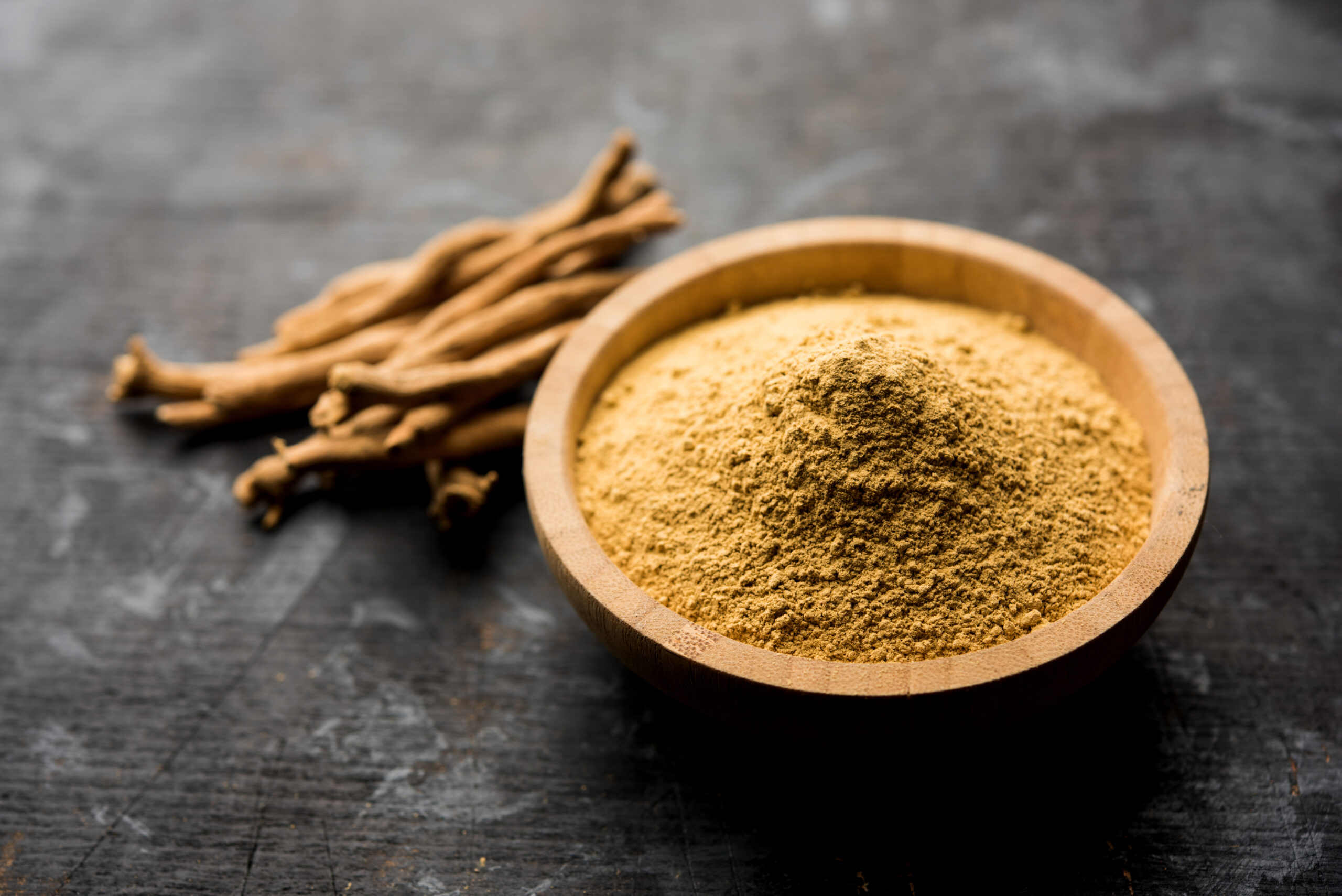
2. Ashwagandha
Doshic Quality: Vata↓, Pitta↑, Kapha↓
Ashwagandha is an incomparable tonic to the mind and body alike. It is known as a rejuvenative (Rasayana) herb as it increases energy, strength, muscle mass, libido, vitality, and immunity (Ojas). It is considered an adaptogen and nervine, as it calms the mind, strengthens the nervous system, and reduces stress levels. A unique special quality, or Prabava, that Ashwagandha possesses is its ability to increase energy in the body and mind during the day, but when taken at night (say in warm milk), it is equally as great for inducing sound sleep. Amazing!
Try our mind-boosting Ashwagandha (and Brahmi) based formula Saraswati Churna.
Energizing Ashwagandha Tonic Recipe
INGREDIENTS
- 1/2 tsp Ashwagandha Powder
- 1/2 tsp Organic Ghee or Rasayana Ghrita
- 1 tsp honey
DIRECTIONS
- Place the three ingredients listed in a small dish.
- Mix the ingredients until they are evenly blended. This should make a thick paste.
- Take this first thing in the morning on an empty stomach. A second dose can be taken between 2-3 pm.
- Rinse down with a cup of plain warm water.
- Alternatively, these ingredients can be mixed in a small cup of warm water and taken as a tea if preferred.
____________________________________________________________________________________________________________________________________
3. Bala
Doshic Quality: Vata↓, Pitta↓, Kapha↑
Bala is the Sanskrit word for strength, and not surprisingly, this adaptogenic and rejuvenative (Rasayana) herb is taken to bring energy and strength to the body. Containing a small (and very safe) dose of naturally occurring amphetamine, this herb is an effective stimulant; however, it is still gentle enough to take during pregnancy (in small dosages) and during Vata disorders. Although this herb is undoubtedly energizing, it is regularly used to treat nervous system disorders and reduce Vata as well. Similar to Ashwagandha, Bala is a powerful herb for increasing libido and sexual potency. To increase energy, strength, and muscle mass, Bala is best taken internally as a medicated ghee (such as the Rasayana Ghrita), or made as a milk decoction (Kwath). One can also use a Bala-infused medicated oil such as the Vata Oil, to apply to the body before the shower each morning.
Read a full list of Bala’s health benefits and uses here!
Rejuvenating Bala Milk Decoction Recipe
INGREDIENTS
- 1 cup of filtered water
- 1/2 cup of whole milk (replace with almond milk if needed)
- 1/2 tsp Bala powder
- 1/2 tsp Organic Ghee or Rasayana Ghrita
- Large pinch of dry ginger
- 1/2 tsp coconut sugar or 1 tsp honey
DIRECTIONS
- Bring 1/2 cup of whole milk and 1 cup of water to a boil.
- Reduce the heat to a simmer and add 1/2 tsp of Bala, a pinch of ginger, and 1/2 tsp of organic turbinado sugar.
- Simmer uncovered until the liquid has boiled down to about 1 cup.
- Drink this each morning upon awakening.
NOTE: This recipe is not recommended if there is excessive Kapha or toxins in the system.
____________________________________________________________________________________________________________________________________
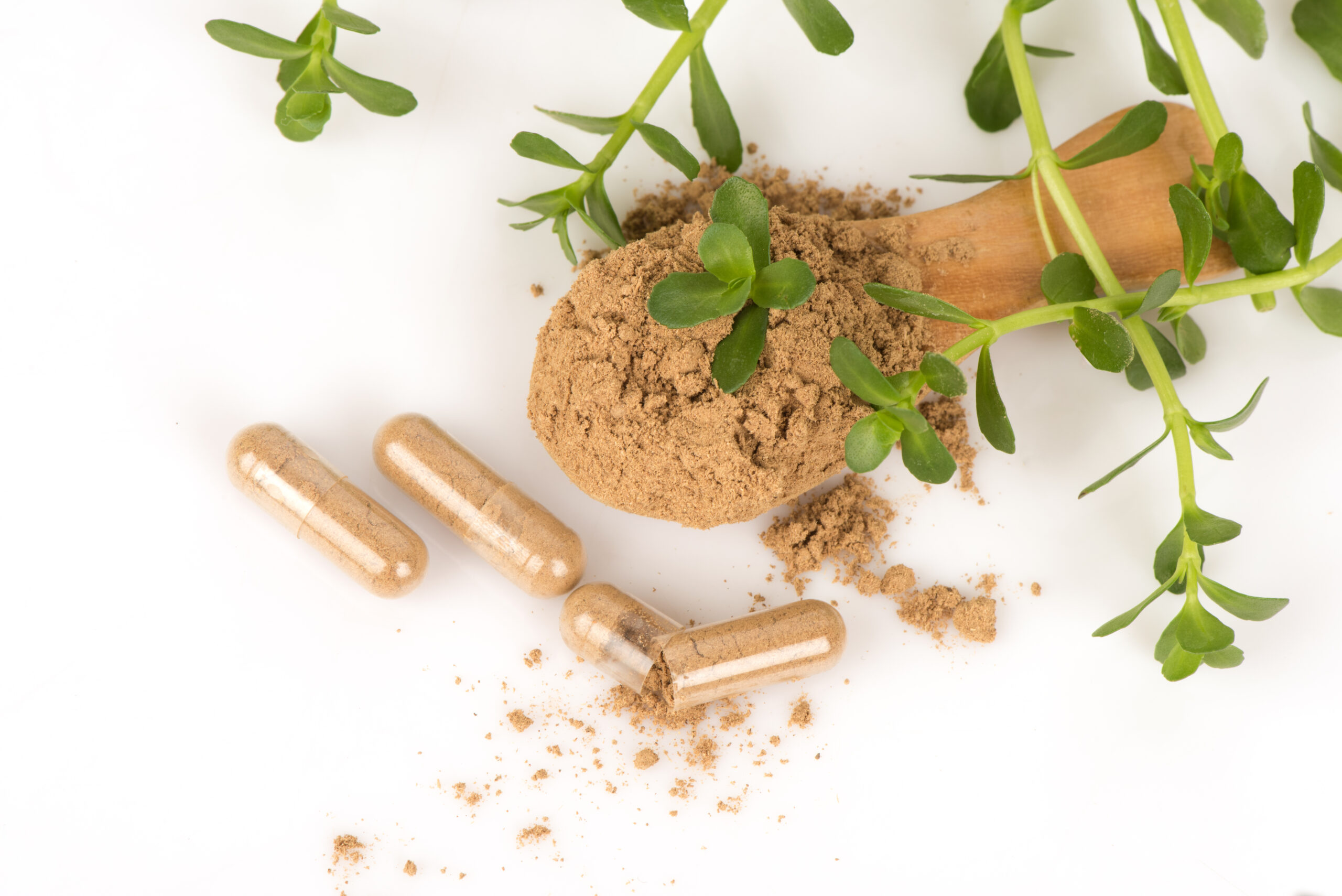
4. Brahmi (bacopa monnieri)
Doshic Quality: Vata↓, Pitta↓, Kapha↓
Brahmi is another essential herb for increasing energy, however, this particular herb is more specific for promoting mental alertness, clarity, focus, and concentration. This mind-boosting herb possesses many unique properties such as stimulating the intellect, increasing memory, and balancing emotions (i.e. anxiety, anger, depression). It is also considered a Rasayana or rejuvenative herb, however, with a strict target directly on the nervous system (hence it rejuvenates the mind and nervous system). Taking this oh-so-sattvic (balancing) herb regularly will not only be sure to promote mental energy but it can also even be paired with more physically energizing herbs such as Ashwagandha or Bala to receive a well-rounded morning dose of mind and body stimulation.
Try our mind-boosting Brahmi (and Ashwagandha) based formula Saraswati Churna.
Stimulating Mind Tonic Recipe
INGREDIENTS
- 1 cup of filtered water
- 1/2 tsp Brahmi powder
- 1/2 tsp Organic Ghee (Kapha types replace with 1/4 tsp Trikatu Churna or ginger powder)
- Optional addition: 1/2 tsp Ashwagandha powder
DIRECTIONS
- Boil one cup of filtered water.
- Take off the heat and add in the Brahmi powder, ghee (or recommended Kapha replacements), and Ashwagandha (if applicable). Stir well.
- Let steep here for 5 minutes or until it becomes a drinkable temperature.
- Pour in a cup and drink. Do not strain.
- Drink this every morning upon awakening and again at 2-3 pm if an energy boost is needed.
____________________________________________________________________________________________________________________________________
5. Shilajit
Doshic Quality: Vata↓, Pitta↑, Kapha↓
Shilajit has been translated as “rock invincible” or “rock overpowering”. It is suggestively known as the “destroyer of weakness” and the “conqueror of mountains”. Shilajit is not actually an herb but a tar-like ooze that stems from aged and composted herb matter. It is naturally rich in over 85 essential minerals and antioxidants. These nutrients are responsible for the incomparable anti-aging, energy-enhancing, and cellular rejuvenating properties that Shilajit possesses. This unique Ayurvedic stimulant can be taken 1 to 3 times daily and is commonly mixed in warm milk, with honey and ghee, or simply steeped in warm water. Since Shilajit can be very hot by nature, it is often not recommended for Pitta types as it can increase heat and acidity in the system.
Read a full list of Shilajit’s health benefits and uses here!
Simply Energizing Shilajit Recipe
INGREDIENTS
- 1/2 tsp Shilajit powder (please find a high-quality brand, there are many frauds out there!)
- 1 tsp honey
- 1/2 tsp Organic Ghee (Kapha types replace with 1/4 tsp Trikatu Churna or ginger powder)
DIRECTIONS
- Place the ingredients listed in a small dish.
- Mix the ingredients until they are evenly blended. This should make a thick paste.
- Take this first thing in the morning directly before breakfast. If needed this can be taken again around 2-3 for a mid-day pick-me-up.
- Rinse this down with a cup of plain warm water.
- Alternatively, these ingredients can be mixed in a small cup of warm water and taken as a tea if preferred.
____________________________________________________________________________________________________________________________________
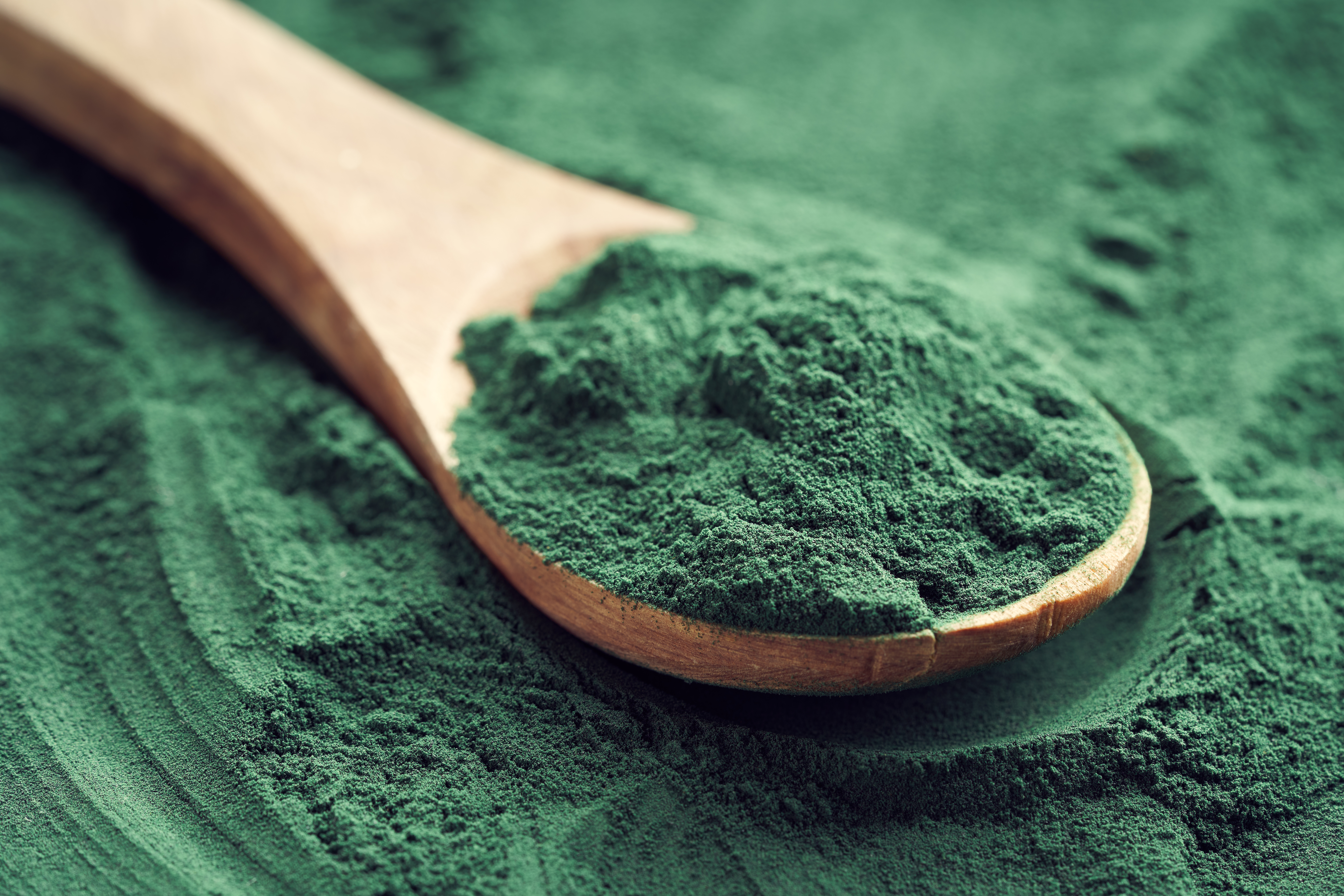
6. Spirulina
Doshic Quality: Vata↓*, Pitta↓, Kapha↓
*May increase Vata in excess
Although not Ayurvedic by nature, Spirulina is undoubtedly an energizing herb (actually algae) and is a great replacement for your morning caffeine. This bright green powder gets its stimulating properties through the high amounts of vitamins (especially B vitamins), minerals, and antioxidants that it provides. It is often added in smoothies, however, it tends to be more energizing if you can simply mix it in warm water and drink it straight up (many smoothies can be heavy and create sluggishness). This allows for better absorption and reduces the heaviness that smoothies can often bring (sorry smoothie lovers!).
My absolute favorite way to take my daily dose of Spirulina is in our Svastha Super Greens, as this blend (which also contains Brahmi as the main ingredient) has a much milder taste, dissolves in water easily, and it has a milder and more pleasant taste. I always take 1 to 2 teaspoons of the Super Greens each morning as an Ayurvedic “pre-workout drink” before my daily gym or yoga session and it definitely does the trick!
Try our energizing Svastha Super Greens!
Since Spirulina can increase the Air and Space element (aka Vata) in the body, it is often recommended to take it with small amounts of warming, digestive herbs to help with the digestion and absorption of this green powder (another reason to take the Super Greens!). The recipe below is also nice, as it contains warming spices as well as a small amount of oil to help with absorption, reduce any dryness, and keep Vata at bay.
Energizing Spirulina Plus Drink Recipe
INGREDIENTS
- 1-pint ball jar with an airtight lid
- 1 cup lukewarm water
- 1/2 tsp Spirulina powder*
- 1/2 tsp Brahmi powder* (option but highly recommended)
- 1/2 tsp coconut oil or Rasayana Ghrita (omit for Kapha)
- 1/4 tsp cinnamon powder
- 1/4 tsp of ginger powder
*These herbs can be replaced with 1 teaspoon of Svastha Super Greens.
DIRECTIONS
- Place 1 cup of lukewarm water in a ball jar.
- Add in the remaining ingredients.
- Place the cap on the ball jar, ensuring that it is completely air-tight. This is extremely important to avoid a very large mess!
- Once the lid is properly placed, shake the jar for about 1 minute vigorously. I often do this over the sink, just in case!
- Drink this blend each morning upon awakening. This can be taken again 1 to 2 times throughout the day if a mid-day energy boost is needed.
- As mentioned before this can be a great replacement for not just coffee, but as a “pre-workout” drink as well.
Try our energizing Spirulina-filled Svastha Super Greens!
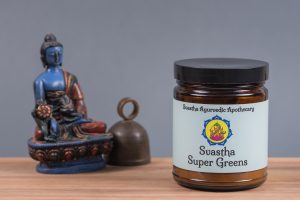
Try our rejuvenating Rasayana Ghrita!
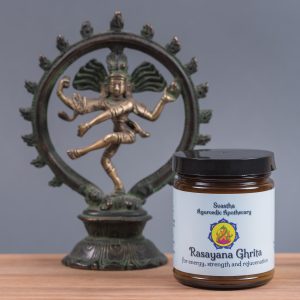
*Full Disclosure Note: All Amazon links are through an affiliate program but have been recommended with care! By purchasing directly through any of these links, you are helping to support Svastha Ayurveda:)

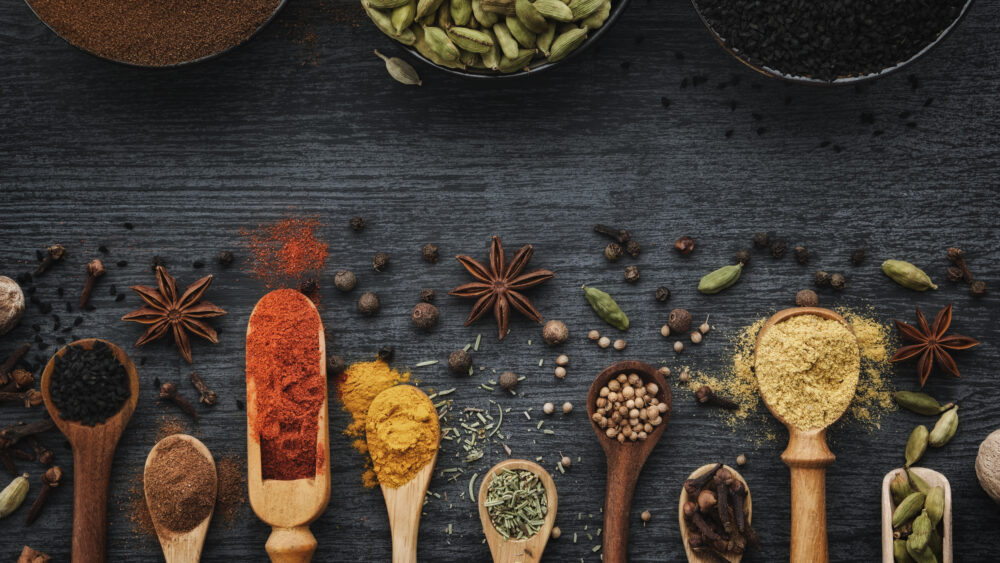
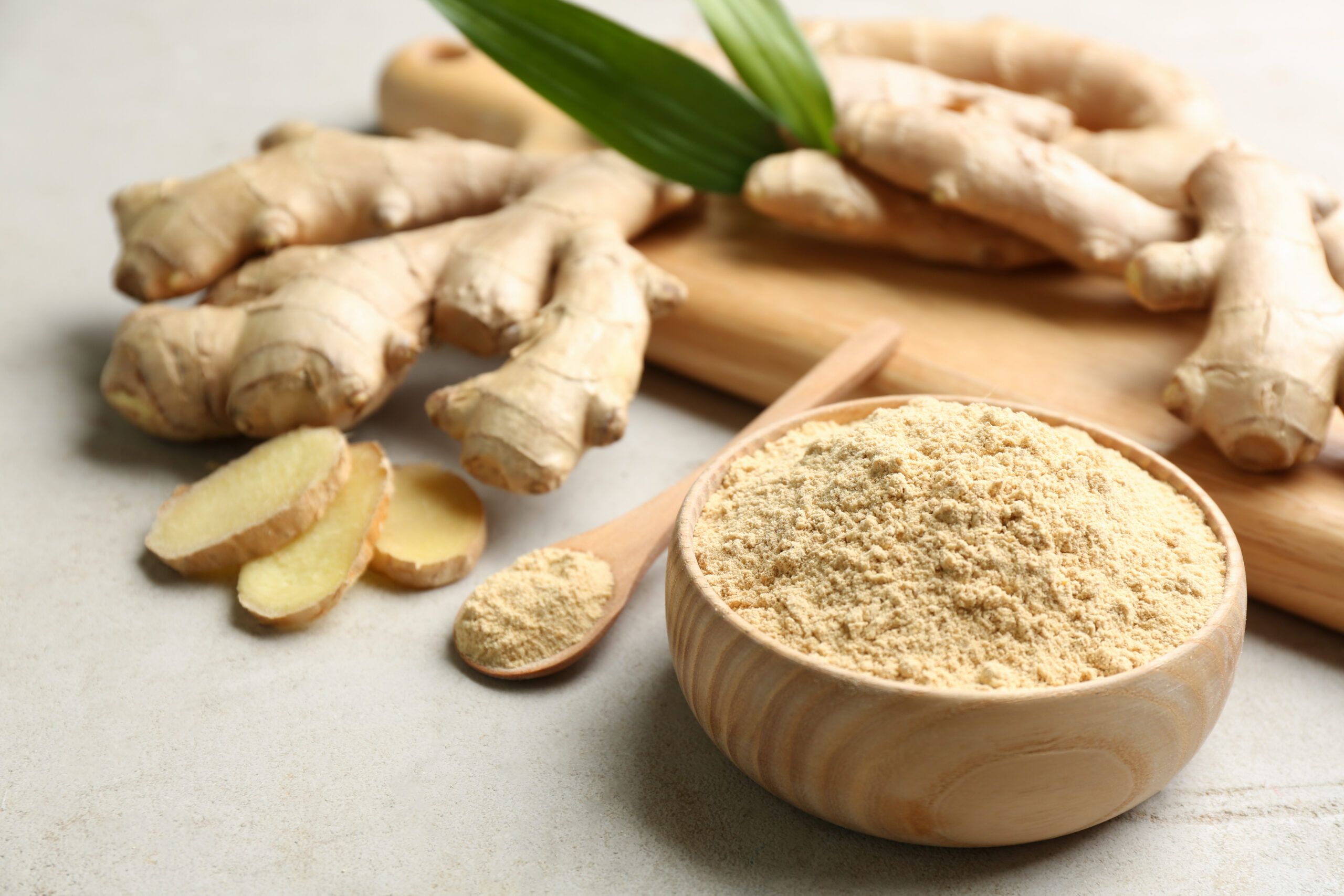
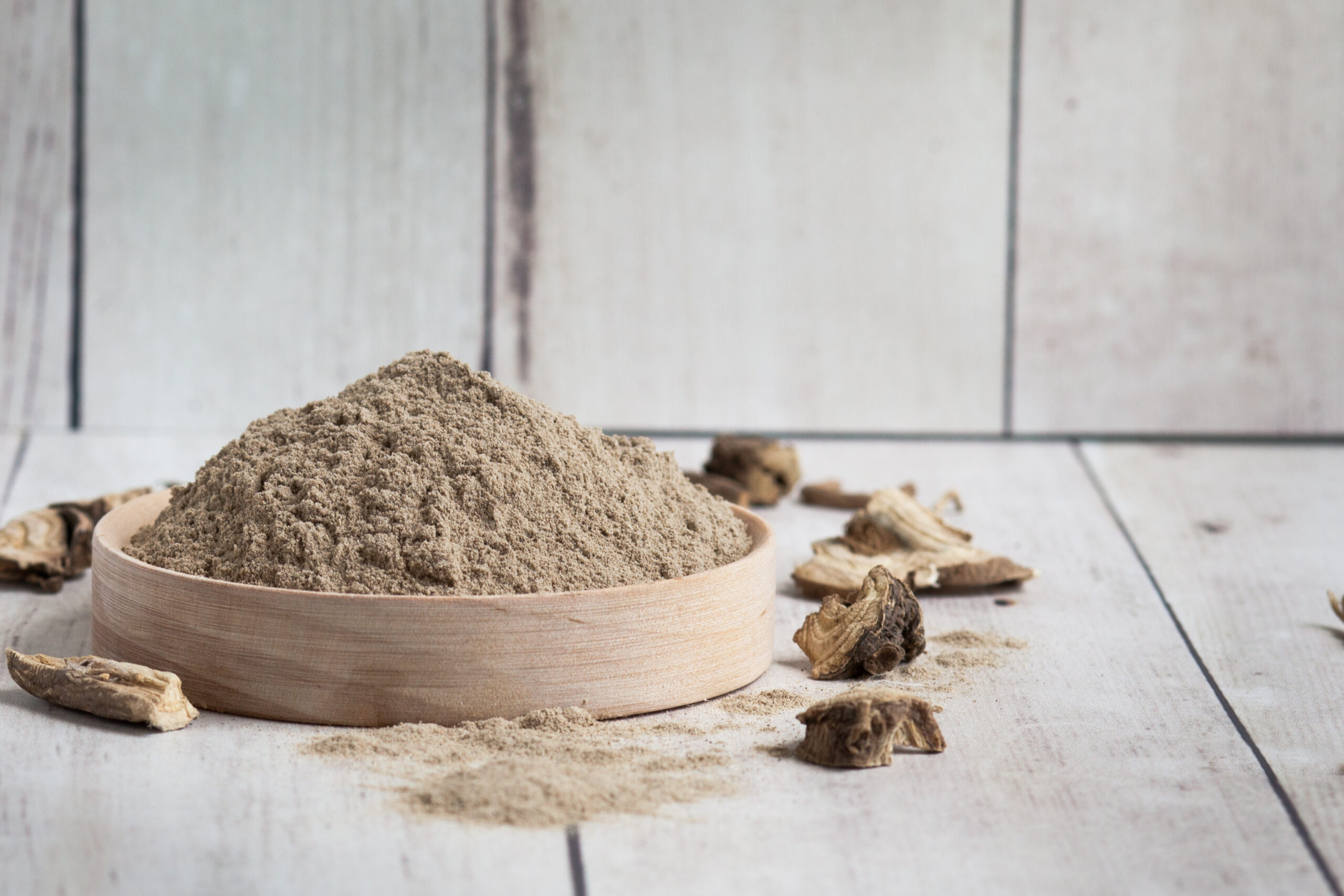
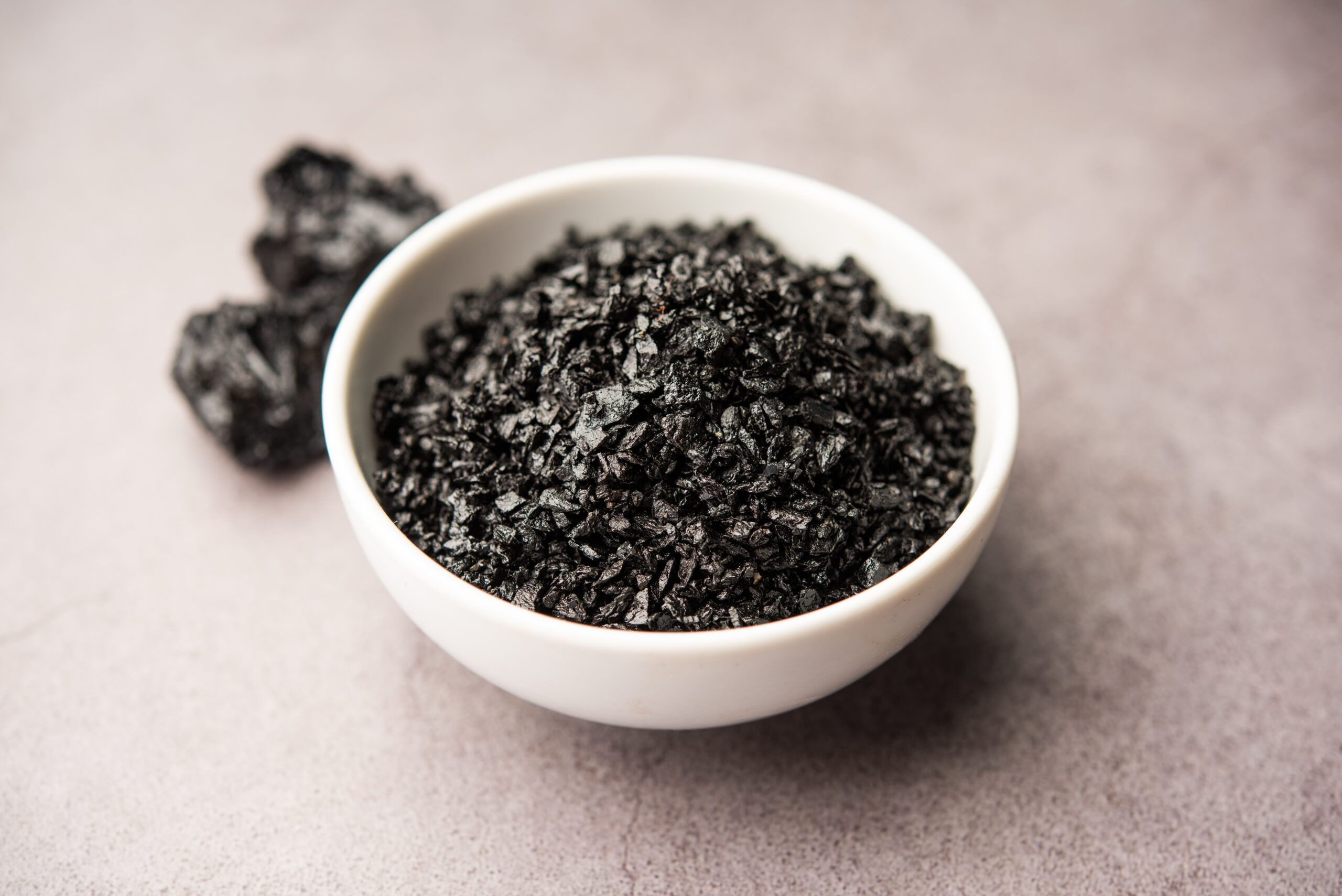
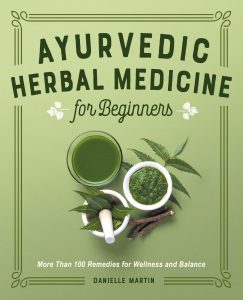

My energy level has doubled since being in to see you and I haven’t had a drop of caffeine!
Thank Josiah! I am so happy to hear:) Keep up the great work!
Namaste,
Danielle
Is it ok to combine Svastha Super Greens with Chyawanprash?
Hi Nafisa! Thank you for your question. I would recommend to take them separate if possible, only because they both contain a large amount of herbs. Taking them together can overload the digestion, and they will not be absorbed as well as taking them at different times. I would recommend taking them at least 3-4 hours apart from each other. Thanks again!
Namaste,
Danielle
Thank you!
Can you recommend a shilijat source?
Hi Alli,
Thank you for your question! I use Omica Organics for the Shilajit in my clinic apothecary as well as for my personal use.
I get their powdered Shilajit since I add it to my client’s formulas often, but they offer a high quality resin paste as well. I take about 1/8 to 1/4 tsp each morning in warm water with great results for energy and overall health.
Let me know if you have any further questions!
Namaste,
Danielle
Much appreciated!